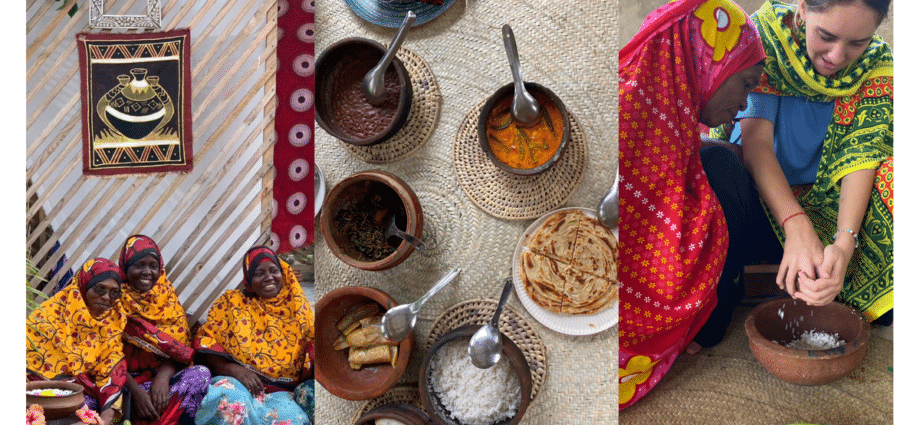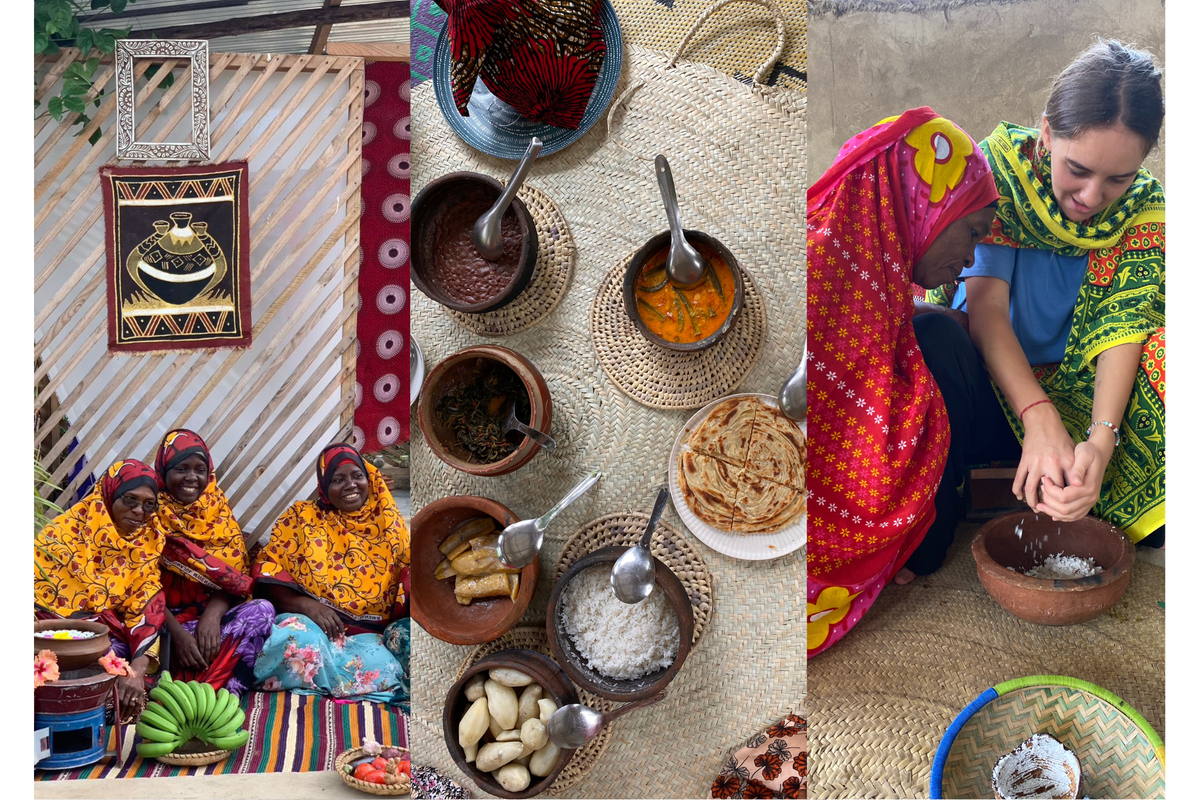Zanzibar. In Zanzibar, in a society where marriage is highly valued, divorce is often stigmatised, particularly for women.
Yet, one woman called Maskat Shineni Abdullah, decided to challenge the stereotypes through her culinary initiative, Mamas of Zanzibar.
The initiative is dedicated to empowering, motivating, and supporting Zanzibari women within the community.
Without even being sure I was in the right place, I got out of the car at Meli Nane, Bububu, famously known as Ngalawa.
Two radiant women with bright smiles, dressed in red and pink kangas, rushed towards me with open arms and embraced me like a member of their family.
The immediate warm welcome made me feel a powerful and touching sense of sisterhood, instantly grasping the richness of these women and the initiative.
Talking about her choice to found the project, the spirit of solidarity immediately comes to the forefront.
“After living a few months here, I got to know the mamas in my neighborhood. I got to know them personally, about their lives and their stories. It touched me because most of the mamas are very hard-working. So I tried to imagine something that I could do to help these ladies,” Maskat said.
As a study from UN Women published in 2020 underlines, women and girls in Zanzibar are distinctly disadvantaged in the areas of poverty and hunger, health, education, decent work and gender equality.
As observed globally, the current pandemic puts women in an increasingly vulnerable position as primary caregivers and informal sector workers.
In a patriarchal society, these challenges are even harder to face when a woman finds herself alone and without a male presence.
Maskat took courage and resilience to create her project.
She said divorced women in Zanzibar are looked down upon and often blamed for their situation.
“When I started this, it was very hard because I was a divorcee. I was a single mom living alone. So this is not the norm in Zanzibar society. It was very awkward and new to people. And also, if you’re a divorced woman in Zanzibar, not having a male person living around, is difficult. People don’t approach you in the same way. So I have to stand up a lot, twice more than I would if I were married,” she confides.
Maskat decided to launch a project in a sector that the Zanzibari women know better than anyone: cooking.
Given that tourism is Zanzibar’s primary source of income, the goal was to integrate these two areas by providing an authentic, local, and sustainable experience that also promotes the economic empowerment of the Mamas.
Maskat explains her choice of the culinary branch and how this field reflects the authentic Zanzibari culture.
“A thing that we all have in common is cooking. We love to cook and we know how to do so. Zanzibaris are well known for their cuisines and the fusion of different cultures in them. We have Indian dishes, Arabic dishes, Persian dishes… there is a big mix. Unlike the Tanzanian mainland, the food here is distinctly different. The cuisine is something that keeps everybody together. Everybody needs to eat and it’s also a way to exchange stories, get to know each other, and where local people and visitors can meet,” she adds.
Maskat had the idea. The next step was to figure out how to bring it to life.
Starting from scratch, she began talking to her neighbours, who would later become her sisters at Mamas of Zanzibar.
She taught them about personal hygiene and guest hygiene and showed the women how to welcome and properly host visitors.
“I pulled it up on AirBnB experiences, and I received my first booking in January 2022. But I didn’t even have a kitchen. So I had to build something very fast, but they never showed up. Then, we got our second booking, which was from an American lady and she’s still in contact and is my number one supporter online. But the mamas were very nervous. They never worked before, so it was also challenging,” she declared.
After a challenging start where the brave women had to persevere, Mamas of Zanzibar finally managed to achieve impressive rapid growth, winning unanimous praise from visitors and convincing locals of the project’s viability.
To date, the success of Mamas of Zanzibar has directly or indirectly benefited around 15 women.
“It’s not just the women working here; we also have fishermen, market vendors, the woman delivering my food, and the lady managing the shop I established. Everyone can benefit from this project in some way,” says Maskat.
She is eager to contribute to the economic empowerment of as many women as possible.
She also aims to teach them to care for themselves, as they are traditionally taught to care for others.
Thus, Mamas of Zanzibar brings together sisters, united in resilience, but also in kindness and mutual support.
While the joy and relief of the women who surrounded me throughout my experience were evident on their faces, their testimonies further attest to the success of their initiative.
““My life has changed since joining this project. I specialise in spiced coffee, and with Mamas of Zanzibar, I’ve learned a great deal about everything, particularly in welcoming guests,” says Ms. Subira Mikidadi Sharif,” says Ms Subira Mikidadi Sharif.
“Since I started working with Mamas of Zanzibar, I’ve been able to improve my house. It was falling apart, so I needed to demolish and rebuild it. With the money I’ve earned, I’m gathering all the materials to complete the construction. I also dug a hole for the toilet, and, previously, I lacked electricity and water. Now, thanks to the income I’ve earned, I have all these necessities,” she says.
With emotions, Ms Semeni Khatib Juma also shares her experience.
“My biggest job is to teach how to make chapatis for Mamas of Zanzibar. Together, especially thanks to Maskat, the initiative empowers us. We were just housewives, and she called us and pulled us together to start this,” she says.
Ms Semeni says they struggled at the beginning, starting very hard.
They didn’t know what to do or if they could do it, but they managed.
“I didn’t know even how to receive guests, but now I’m close to them. I feel really more comfortable. We are very proud because we learned a lot. We can even adapt now to special diets. All the fear and stress have disappeared. Mamas of Zanzibar has improved a lot in my life, for my husband, and for my kids. I also get to teach my children; I get to pay school fees,” she adds.
In addition to Mamas of Zanzibar, Maskat also decided to support the local football team.
“A lot of young boys are in the streets and they don’t have something particularly to do. So we’ve created a football team. I want to create a chance for the guests who are travelling to Zanzibar to come and play with the local boys. It’s a friendly game, you can get to know them and keep them motivated. Such as Mamas of Zanzibar, this initiative is a real way to empower them and give them hope,” she declares with proudness.
Maskat doesn’t plan to stop there, as she already has other future plans in mind. In light of the success of Mamas of Zanzibar, she thus aims to open a branch in the north of Zanzibar, arguing that “when I was living there, I saw them every morning working very hard, and I think that it can interest guests too. I would like to start a project there for the mamas who are working in the ocean,” she says.














